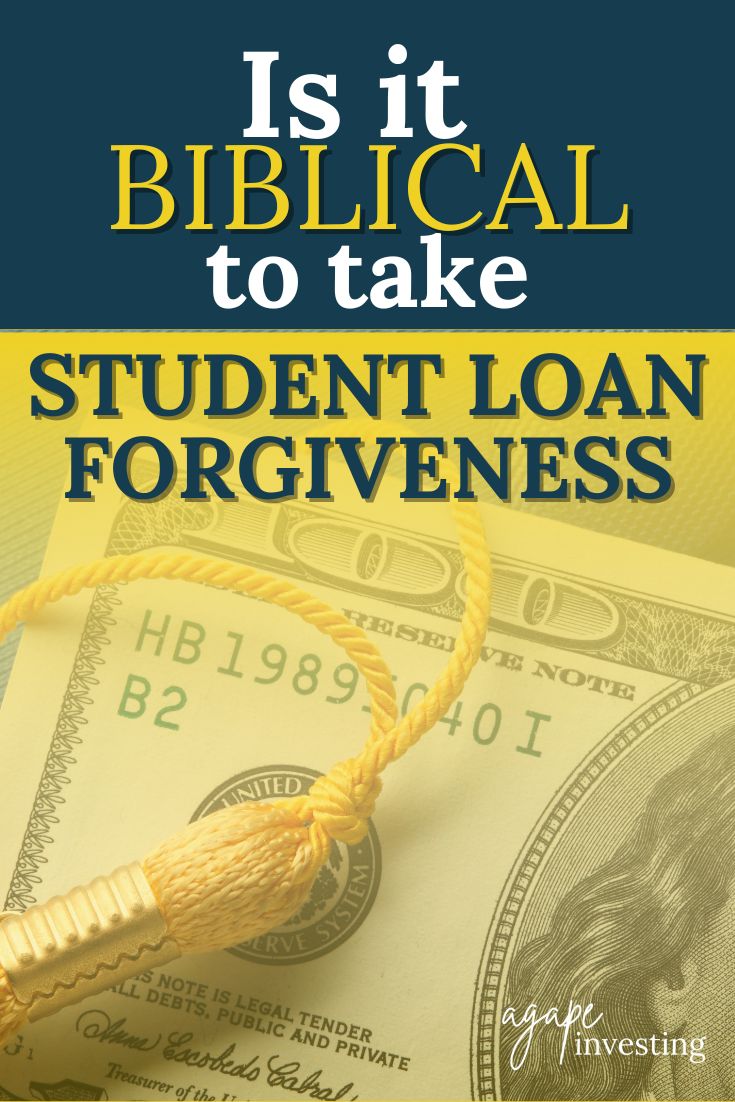Should Christians Use Student Loan Forgiveness?
The news of Biden’s student loan forgiveness program came and hit the country with a multitude of different emotions. Upon initially reading the headline, my first thought was, “Why couldn’t this have come 2 years ago when I was still paying off my student loans!?” Then my second thought was that I needed to share this news with everyone because this could really help a lot of young professionals including many of my coaching clients!
However, as I continue to think about it and as I now examine the potential impact that this forgiveness could have on the economy, especially the middle & lower class, my thoughts have been a swirling mess of confusion! Now, I ask myself this question… Should Christians use student loan forgiveness?
Let’s take a look at this from a few different perspectives to see whether it is Biblical or not to take student loan forgiveness.

What Does the Bible Say About Debt
Having debt is not sinful. In fact, there are plenty of examples throughout the Bible of individuals who have debt and even examples of believers who have lended money to others. If having debt was a sin or if it went against God, he would definitely not condone lending money to others.
Matthew 5:42
Give to the one who asks you, and do not turn away from the one who wants to borrow from you
Deuteronomy 15:6
For the Lord your God will bless you as he has promised, and you will lend to many nations but will borrow from none. You will rule over many nations but none will rule over you.
However, it’s clear that God wants us to understand one very important fact about debt. Even though it’s not sinful to have it, we shouldn’t go seeking to take on new liabilities. Why? Because debt enslaves us. Check out this passage in Nehemiah 5:
“Others were saying, “We are mortgaging our fields, our vineyards and our homes to get grain during the famine.”
Still others were saying, “We have had to borrow money to pay the king’s tax on our fields and vineyards. Although we are of the same flesh and blood as our fellow Jews and though our children are as good as theirs, yet we have to subject our sons and daughters to slavery. Some of our daughters have already been enslaved, but we are powerless, because our fields and our vineyards belong to others.”
Nehemiah 5:3-5
They did what they needed to do and borrowed money when they had no other options, but they understood that by doing this they had enslaved themselves.
The Bible is very clear that debt should be avoided. If that passage in Nehemiah wasn’t clear enough, just check out Proverbs 22:7, and Matthew 6:24.
We Are Called to Pay Off Our Debts
The last Biblical lesson I will share about debt is that when we have it, it must not be ignored. In fact, many passages throughout the Bible express that we should actually PAY OFF our debts. Not that we should seek a way out of them…
Give to everyone what you owe them: If you owe taxes, pay taxes; if revenue, then revenue; if respect, then respect; if honor, then honor. Let no debt remain outstanding, except the continuing debt to love one another, for whoever loves others has fulfilled the law.
Romans 13:7-8
You can also look to Psalms, Proverbs, and Ecclesiastes to learn that when you DO NOT pay back your debts it is considered “wicked,” and “foolish.”
Psalm 37:21 The wicked borrow and do not repay, but the righteous give generously;
Proverbs 22:26-27 Do not be one who shakes hands in pledge or puts up security for debts; if you lack the means to pay, your very bed will be snatched from under you.
Ecclesiastes 5:4 When you make a vow to God, do not delay to fulfill it. He has no pleasure in fools; fulfill your vow.
We have a Biblical call to take personal responsibility to pay for the services we receive.
Debts Being Forgiven in the Bible
Now, as I always like to remind my readers and YouTube viewers, the Bible is not an instruction manual from which we simply derive principles and rules… The Bible is a collection of letters, parables, and stories to ultimately express God’s love for each of us.
We can take passages out of the Bible to give us wisdom in certain situations such as paying off debt and other areas of money management. Some passages may point us in one direction and yet others may point us in the opposite.
That being said… Yes, we read that we should pay off the debts we have taken out, while on the other hand there are many examples of debts being forgiven. Not to mention that the greatest debt of all was paid for each of us through the blood of Jesus Christ. Praise God for paying the price for our sins!
The Year of Canceling Debts is another example of how the Israelites were commanded to forgive the debts they had against others. Here’s how it is explained in Deuteronomy:
At the end of every seven years you must cancel debts. This is how it is to be done: Every creditor shall cancel any loan they have made to a fellow Israelite. They shall not require payment from anyone among their own people, because the Lord’s time for canceling debts has been proclaimed.
Deuteronomy 15:1-2
Jesus also shares another example of debts being forgiven which is mentioned in Luke 7:
“Two people owed money to a certain moneylender. One owed him five hundred denarii, and the other fifty. Neither of them had the money to pay him back, so he forgave the debts of both. Now which of them will love him more?”
Simon replied, “I suppose the one who had the bigger debt forgiven.”
Luke 7:41-43
It can also be argued that forgiving the student loan debts of others and offering free education is a way we can love our neighbors. Mark Kelly an assistant professor of economics at Baylor University says it well in his article for The Gospel Coalition:
“It’s fair to say an educated population is a good thing. Studies show that more educated individuals are more productive, make their colleagues more productive, commit fewer crimes, and are healthier. Some Christians could reasonably argue that providing free education, as we do for K–12, is a tangible way of loving our neighbors, especially those who can’t afford college.”
The Biblical Problem With Forgiving Debts
In the example that Jesus shared in Luke 7, Jesus asks Simon who would love the lender more after the debts had been forgiven. I think many of us without a doubt respond that the one who had a greater amount of debt would love the lender more once the debts had been forgiven. This is a fair assumption, in fact, it is what Jesus was trying to teach.
But what if that isn’t always the case? Jesus also gives us a fantastic example of this as well and that is in the Parable of the Unforgiving Debtor.
Jesus shares another story of a servant who had an enormous amount of debt completely forgiven by his master. However, this servant is considered the unforgiving debtor because after he was freed from paying his debt, he basically learned nothing from it…
One would assume that after having such a great debt forgiven that he would be filled with generosity and a passion to go and do for others what had been done for him! That was not the case. In fact, practically the opposite happened. He became incredibly entitled.
This sense of entitlement is similar to Dietrich Bonhoeffer’s concept of “cheap grace.” Meaning that the grace of God covers everything and therefore everything can remain as it was before we were believers.
“Cheap grace is the preaching of forgiveness without requiring repentance, baptism without church discipline, Communion without confession…. Cheap grace is grace without discipleship, grace without the cross, grace without Jesus Christ, living and incarnate.” Dietrich Bonhoeffer in The Cost of Discipleship.
It is my opinion that by offering student loan forgiveness college graduates across the nation may become entitled and feel that they deserve this kind of forgiveness at no cost to them.
But the reality is that even as someone had to pay the price for your sins (aka Jesus), someone will need to pay the price for this debt forgiveness. We cannot view student loan forgiveness as a “free pass” just as Bonhoeffer reminds us that there is a cost to being a follower of Christ.
The student whose debts are forgiven will have less of a financial burden on their own shoulders, but that burden falls onto the rest of us Americans. Therefore, if you argue that forgiving student loans are a way we can love our neighbors I would challenge you with this thought also shared in the article from The Gospel Coalition:
“Offering a government-funded college education would not be fair to taxpayers who do not have student debt. Remember, only 13 percent of Americans owe loan debts to the federal government. Is it fair to ask for that much funding from past generations of students and their parents who have already paid for their education? And what about workers who never attended college, many of whom will earn less in their lifetime than college graduates? Should these individuals now be required to pay for the education of others in the form of higher taxes and fewer government services?”
What Student Loan Forgiveness Means for the Economy
President Biden’s new student loan forgiveness plan includes three major components. We estimate that debt cancellation alone will cost up to $519 billion. Loan forbearance will cost another $16 billion. The new income-driven repayment (IDR) program would cost another $70 billion, increasing the total plan cost to $605 billion under strict “static” assumptions. However, depending on future IDR program details to be released and potential behavioral (i.e., “non-static”) changes, total plan costs could exceed $1 trillion. (See more of the numbers crunched here)
Ultimately, this financial burden is most likely being placed onto the shoulders of many who either 1) have already finished paying their own loans off or 2) have never gone/will go to college. This program benefits only 13% of the population and leaves the other 87% with the bill, many of whom never received a college education.
The program may sound like a great solution to the student debt crisis, however, it is a bandaid solution that addresses the exterior wounds but does not cure the underlying disease that our country faces. Art Rainer said it well in a comment on Facebook,
“Personally, I’m not a fan of the move, not because it is a Democrat making the decision, but because I believe it will lead the nation down a dangerous path and hurt middle and lower class families the most. I am also not a fan of the move because it doesn’t solve anything. This deals with a symptom, not the underlying illness. It’s giving Advil to a cancer patient. While these loans are being forgiven, another generation just signed their new student loan agreements. We have a real problem that needs to be dealt with.”
Some argue that this forgiveness program will only add fuel to the already blazing fire. Marc Goldwein, senior policy director at the Committee for a Responsible Federal Budget says,
“People are going to assume there’s a likelihood that debt is canceled again and again, and if you assume there’s a likelihood it’s canceled, you’re going to be more likely to take out more debt up front. That’s going to give colleges more pricing power to raise tuition without pressure and to offer more low-value degrees.”
Outstanding student debt has now eclipsed $1.6 trillion, making it the second-largest source of consumer debt behind mortgages. The federal government is the largest creditor, owning $1.3 trillion in outstanding debt from nearly 43 million Americans. By canceling billions of dollars of government-owned student loan debt, there is bound to be a massive economic ripple in America. What exactly that might look like is up for speculation right now, and will be hard to measure with all the different moving pieces in the economy at the moment.
Final Thoughts Should Christians Use Student Loan Forgiveness?
The reality is that this debt forgiveness program is disguised as something helpful that is going to cause more harm to ourselves, our children, and our brothers & sisters in and outside of Christ which in turn makes it a poor stewardship decision for the country.
As I mentioned at the beginning of this article, if I still had student loans I would probably take advantage of student loan forgiveness myself. I ended up paying my student loans off back in 2020. Debt ultimately keeps us from experiencing true financial health. It keeps us from saving more, and even greater than that debt is a generosity killer…
If you are struggling to support the forgiveness program as a follower of Christ then follow the direction that the Lord is leading you. You are not alone and there are plenty of Christians out there who will not participate in the forgiveness program even though they qualify.
If you are on the fence I would also recommend that you go to God with this decision. Prayerfully consider what he may be prompting you to do.
I’m also curious to know what your thoughts are too. Should Christians use student loan forgiveness?
Work on Paying Off Your Debt Today!
Got debt?
Grab my Biblical Money Management Checklist for free so you can start putting together a plan to become debt free and on your way to managing your money with excellence!
You May Also Like
How to Pick a Debt Payoff Strategy
What Does the Bible Say About Credit Cards?
Critical Questions to Ask About Your Student Loans
Should You Pay Off Debt or Save More Money?




This is the complete antithesis of what Jesus Christ taught his disciples to pray for and tried to teach people, oh, I don’t know, say…the Pharisees, while he was on Earth. The year of the Lord’s favor, the Jubilee tradition went back we know to Mesopotamia at least. When he refers to this time in Luke, he is speaking of the tradition laid out in Leviticus 25, which prescribes a regular practice of clearing debts in order to correct for accumulated injustice of an unequal distribution of resources in society. Jesus taught to pray for the forgiveness of debt, and that we are to forgive as the Lord forgives us.
Tax the church, “non profit” hospitals, and the elite 1% that do not pay fair share
Time for your free ride to end